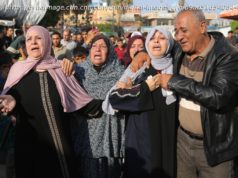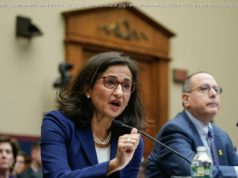President Trump’s harsh rhetoric on the Hurricane Maria recovery could be a headache for Florida Republicans, who expect to see an influx of Puerto Rican voters.
While President Donald Trump spent the weekend attacking the mayor of San Juan and blasting negative coverage of Hurricane Maria recovery efforts, Florida state Rep. Bob Cortes was worried about his daughter in San Juan’s western suburbs.
Cortes’ daughter, Leslie, and her 2-year-old son, Jeremy, had their roof torn off during Hurricane Maria, and two feet of water rushed into their house in Dorado.
“I was terrified they were going to lose their lives,” Cortes said, as his voice trembled.
The second-term Republican lawmaker from Altamonte Springs spent days trying to reach family members in Puerto Rico and is asking anyone he can for help.
They might not be directly criticizing Trump. But Florida Republicans are taking a noticeably different tack from the leader of their party when it comes to Puerto Rico, an issue that affects some of them, like Cortes, personally — and many of them politically.
Instead of adopting the president’s finger-pointing rhetoric, the federal and state GOP lawmakers are highlighting the need for action in Puerto Rico. Some 1 million Puerto Ricans call Florida home.
Last week, U. S. Sen. Marco Rubio urged Trump to let the military lead logistical Hurricane Maria relief efforts. Gov. Rick Scott announced Monday that Florida will open relief centers Tuesday for Puerto Ricans arriving in Miami and Orlando. He also asked schools to give in-state tuition to Puerto Rican students displaced by the hurricane.
How many might come is unknown. “A lot,” Scott guessed.
Rubio has said this isn’t the time to talk hurricane-relief politics, but a day before Trump was scheduled to land in San Juan, the senator acknowledged the initial response from the administration could have been swifter.
“In hindsight, we all wish we could get those three or four days back,” Rubio told reporters in Miami on Monday after they asked if Washington could have done more — and more quickly — to aid the island. “I want us to focus 100 percent on what we need to do to improve the recovery effort. And we have plenty of time in the future to sit there and point to the mistakes that were made…. But right now every minute we spend doing that sort of thing is a minute that isn’t being spent trying to improve reconstruction and deal with it.”
State lawmakers said that an influx of thousands of Puerto Ricans won’t go unnoticed.
“Florida’s the closest one to Puerto Rico, and it’s ground zero for relief efforts,” said Cortes, who represents a portion of Orange and Seminole Counties. “We’re going to be shipping most of the things they need to get back on their feet.”
Cortes said he expects at least 100,000 Puerto Ricans to relocate to Florida after the storm, and many of them will settle in greater Orlando. Puerto Ricans already tend to vote Democratic, potentially altering the political dynamics of America’s largest swing state ahead of the 2018 elections.
“It can be a game-changer politically,” said state Rep. Amy Mercado, a Puerto Rican Democrat from Orlando. “The speed of what’s occurring, that’s the million-dollar question. How fast, how much and how long?”
A 100,000-vote swing in favor of Democrats would have given Charlie Crist the governorship in 2014 over Scott and would have eaten up most of Trump’s margin of victory over Hillary Clinton in 2016.
But the math isn’t that simple. Not all Puerto Ricans will vote for Democrats, and many will choose not to vote at all. Cortes argued that Puerto Ricans coming directly from the island are more likely to vote Republican than second-or third-generation Puerto Ricans.
“Those that have been coming usually tend to be more ideologically with the Republican Party because they are leaving a place that had fiscal issues,” Cortes said, adding that both parties need to do a better job of reaching out to Puerto Ricans in Florida.
Cortes argued that Puerto Ricans’ affinity for Democrats in Florida is mostly due to regional migration within the United States. Puerto Ricans from Democratic-leaning New York or New Jersey are likely to continue voting Democratic in Florida.
Yet Trump could make it harder for Republicans to court new Puerto Rican voters even though the island’s non-voting delegate in Congress, Jenniffer González – Colón, is a Republican.
University of Florida political science professor Daniel A. Smith surveyed just under 200,000 self-identifying Puerto Rican-born voters in Florida after the 2016 election. He concluded that Trump won about 25 percent of the vote in majority-Hispanic precincts with at least 100 Puerto Rican voters, areas in Florida where Puerto Ricans displaced by Hurricane Maria are more likely to settle due to existing family and cultural connections.
“Trump did very poorly,” Smith said. “One wonders about the mass migration. The question is whether they’re going to be politically active.’
One silver lining for Republicans is that areas with large concentrations of Puerto Ricans already tend to be heavily Democratic. Smith said that Osceola County, which includes Kissimmee and Disney World, is the area where Puerto Ricans have the most political power relative to the entire electorate.
Osceola is represented by Rep. Darren Soto, D-Orlando, the first Puerto Rican in Congress from Florida, and Puerto Rican Democrats represent parts of the county in the state Legislature.
“Florida was decided by one point each election. Any tip of the scale could be significant, though right now it’s hard to tell how many will stay long term,” Soto said, adding that Puerto Ricans tend to vote for Democrats but “they will vote for Republicans if there is sufficient outreach.” Soto traveled to Puerto Rico on Monday.
Scott and Rubio have also traveled to Puerto Rico in the past week, and Rubio sent four staffers to the island to assist in the relief efforts. Both have studiously avoided criticizing Trump.
“I’m not here to assign blame,” Scott said Monday when asked if the federal response was slow. “I know that we’ve worked hard to make sure we solve our problems in our state, and I know Gov. [Ricardo] Rosselló is doing [the same] over there in Puerto Rico.”
Scott wouldn’t speculate on whether any new Florida voters from Puerto Rico could take out their frustration against him if he runs for the U. S. Senate against Democrat Bill Nelson next year.
“I know that people are going to come here from Puerto Rico are going to be hardworking,” Scott said.






